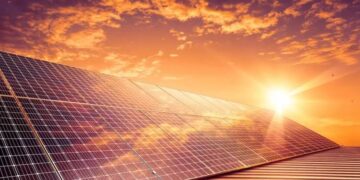By Emmanuel Nduka Obisue
Imports of solar panels into Africa rose by 60 percent in the 12 months to June 2025, setting a new record, according to an analysis of China’s export data by energy think tank Ember.
The continent imported 15,032 MW of solar panels during the period, up from 9,379 MW in the previous 12 months. Analysts say the surge is significant enough to reshape electricity systems across multiple African countries.
The last major jump came in 2023, when South Africa’s solar imports spiked at the height of its power crisis. But this latest surge marks a broader continental shift, with 20 countries reaching record import levels and 25 countries importing at least 100 MW, up from 15 the previous year.
Nigeria Overtakes Egypt
Nigeria emerged as the second-largest importer with 1,721 MW, surpassing Egypt. Algeria followed in third place with 1,199 MW.
Several countries posted remarkable growth: Algeria’s imports rose 33-fold, Zambia’s increased eightfold, Botswana’s sevenfold, and Sudan’s sixfold. Liberia, the Democratic Republic of Congo, Benin, Angola and Ethiopia more than tripled their import volumes.
Potential to Transform Power Supply
If fully installed, recent imports could provide transformative electricity gains. In Sierra Leone, the capacity could generate power equivalent to 61 percent of reported 2023 electricity production, while in Chad it could reach 49 percent. Liberia, Somalia, Eritrea, Togo and Benin could each see generation rise by more than 10 percent. Overall, 16 countries stand to boost supply by at least 5 percent.
Despite these gains, there is currently no comprehensive data on how many panels have actually been installed.
“Bottom-up energy transitions fueled by cheap solar are no longer a choice – they’re our future,” said Muhammad Mustafa Amjad, Program Director at Renewables First. “Tracking these additions is what makes the difference between a messy shift and an organised, accelerated one. When you don’t track, you lose time and opportunities. Pakistan’s experience shows this clearly. Africa’s transition will happen regardless, but with timely data it can be more equitable, planned and inclusive”.
Diesel Cost Savings
The report also highlights the economic impact of solar adoption. In Nigeria, savings from replacing diesel could cover the cost of a solar panel within six months, with even faster returns in other countries.
In nine of the top ten solar-importing nations, the value of refined petroleum imports still exceeds solar panel imports by a factor of 30 to 107. Analysts say this underscores the potential for solar to ease Africa’s heavy fuel import burden in the years ahead.




































